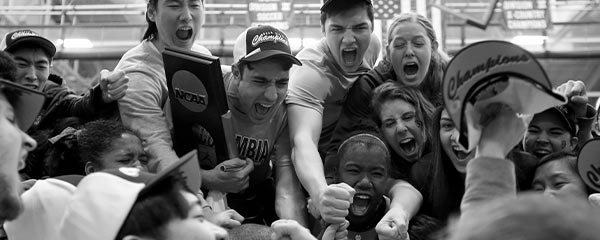WASHINGTON, D.C. -- Thirty-one percent of recent college graduates "strongly agree" that they gained "important job-related skills" while completing their undergraduate degrees, which suggests that a majority of students feel they are lacking in this area when they graduate.
Recent graduates most frequently wish they had received more training in networking and computer software skills. They are much more content with their instruction in traditional subjects like math and writing.
Engineering Graduates Relatively Satisfied With Job-Skill Development
Among graduates of five different academic areas, engineering graduates express the most satisfaction with the link between their education and future work, while those in the sciences and social sciences fall toward the middle. Recent graduates of business as well as arts and humanities programs are least likely to strongly agree they gained job-related skills during college.
| 5 Strongly agree |
4 | 3 | 2 | 1 Strongly disagree |
|||||||||||||||||||||||||||||||||||||||||||||||||||||||||||||||||||||||||||||||||||||||||||||||
|---|---|---|---|---|---|---|---|---|---|---|---|---|---|---|---|---|---|---|---|---|---|---|---|---|---|---|---|---|---|---|---|---|---|---|---|---|---|---|---|---|---|---|---|---|---|---|---|---|---|---|---|---|---|---|---|---|---|---|---|---|---|---|---|---|---|---|---|---|---|---|---|---|---|---|---|---|---|---|---|---|---|---|---|---|---|---|---|---|---|---|---|---|---|---|---|---|---|---|---|
| % | % | % | % | % | |||||||||||||||||||||||||||||||||||||||||||||||||||||||||||||||||||||||||||||||||||||||||||||||
| Engineering | 41 | 33 | 17 | 3 | 6 | ||||||||||||||||||||||||||||||||||||||||||||||||||||||||||||||||||||||||||||||||||||||||||||||
| Sciences | 34 | 27 | 23 | 9 | 8 | ||||||||||||||||||||||||||||||||||||||||||||||||||||||||||||||||||||||||||||||||||||||||||||||
| Social Sciences | 32 | 32 | 22 | 9 | 5 | ||||||||||||||||||||||||||||||||||||||||||||||||||||||||||||||||||||||||||||||||||||||||||||||
| Arts & Humanities | 26 | 24 | 25 | 13 | 11 | ||||||||||||||||||||||||||||||||||||||||||||||||||||||||||||||||||||||||||||||||||||||||||||||
| Business | 25 | 36 | 21 | 9 | 9 | ||||||||||||||||||||||||||||||||||||||||||||||||||||||||||||||||||||||||||||||||||||||||||||||
| Gallup Alumni Survey, Oct. 24-Nov. 7, 2019 | |||||||||||||||||||||||||||||||||||||||||||||||||||||||||||||||||||||||||||||||||||||||||||||||||||
Business majors' tepid endorsement of their job-skill development counters the prevailing wisdom that this major provides ample practical skills training. These views may reveal a deficiency in curriculum or reflect the rapidly shifting skills required by today's business roles. Business majors may also have higher expectations in this area than other students.
Notably, graduates who strongly agree that they participated in a project that took a semester or more to complete were more than twice as likely (41% vs. 19%) as others to strongly agree that they obtained important job-related skills.
These results are based on interviews with more than 1,600 college graduates who completed their bachelor's degree between 2010 and 2019.
Graduates Express Most Regret Over Networking Skills
When asked to choose from a list the job skills for which they wish they had received more training, nearly half of recent graduates cite networking skills, but a third also lament their relative lack of software skills. Most graduates have fewer regrets with their training in public speaking, math and writing.
| Skill | |||||||||||||||||||||||||||||||||||||||||||||||||||||||||||||||||||||||||||||||||||||||||||||||||||
|---|---|---|---|---|---|---|---|---|---|---|---|---|---|---|---|---|---|---|---|---|---|---|---|---|---|---|---|---|---|---|---|---|---|---|---|---|---|---|---|---|---|---|---|---|---|---|---|---|---|---|---|---|---|---|---|---|---|---|---|---|---|---|---|---|---|---|---|---|---|---|---|---|---|---|---|---|---|---|---|---|---|---|---|---|---|---|---|---|---|---|---|---|---|---|---|---|---|---|---|
| % Selecting | |||||||||||||||||||||||||||||||||||||||||||||||||||||||||||||||||||||||||||||||||||||||||||||||||||
| Networking | 49 | ||||||||||||||||||||||||||||||||||||||||||||||||||||||||||||||||||||||||||||||||||||||||||||||||||
| Computer software | 33 | ||||||||||||||||||||||||||||||||||||||||||||||||||||||||||||||||||||||||||||||||||||||||||||||||||
| Organizational | 22 | ||||||||||||||||||||||||||||||||||||||||||||||||||||||||||||||||||||||||||||||||||||||||||||||||||
| Communication | 20 | ||||||||||||||||||||||||||||||||||||||||||||||||||||||||||||||||||||||||||||||||||||||||||||||||||
| Public speaking | 19 | ||||||||||||||||||||||||||||||||||||||||||||||||||||||||||||||||||||||||||||||||||||||||||||||||||
| Math | 15 | ||||||||||||||||||||||||||||||||||||||||||||||||||||||||||||||||||||||||||||||||||||||||||||||||||
| Writing | 14 | ||||||||||||||||||||||||||||||||||||||||||||||||||||||||||||||||||||||||||||||||||||||||||||||||||
| Gallup Alumni Survey, Oct. 24-Nov. 7, 2019 | |||||||||||||||||||||||||||||||||||||||||||||||||||||||||||||||||||||||||||||||||||||||||||||||||||
Notably, college graduates who aren't dissatisfied with their training in networking skills are more likely to strongly agree that their alma maters prepared them well for life after school and that their education was worth the cost.
Implications
These findings suggest that colleges and universities can do much more to ensure that students graduate with solid networking skills. To help foster these skills, universities should coach students to build relationships in their spheres of academic and professional interest. Many colleges could further leverage their alumni networks, a vast and largely untapped source of networking potential, for this purpose.
Gallup has found, for example, that only 9% of graduates find their alumni network to be helpful or very helpful in the job market. By connecting students with alumni as soon as they arrive on campus, universities might help students improve their networking skills while encouraging alumni to provide more job-hunting assistance.
Recent graduates' views on job-skill training also offer a lens into declining American perceptions of the value of a college degree. Graduates' lack of certainty that they fully refined their job skills in school could help explain why Americans are less likely today than in 2013 to believe a college education is "very important."
Alas, the road to improvement on this front just grew bumpier. The unsettled nature of campus life during the fall semester, as well as the continued emphasis on social distancing, will likely make it more challenging to help students develop job-related skills, especially the subtle art of networking.
As campus leaders make plans to create a safe, educationally sound learning environment this fall, they should remember that students are looking for guidance on how to build relationships with others.
Perhaps the democratizing nature of the online environment -- with every student occupying a similarly sized virtual square -- will encourage the exploration of new relationships. At minimum, students will be able to forge bonds over their unique fall experience.
Learn more about the Gallup Alumni Survey.
Learn more about Gallup Education.




